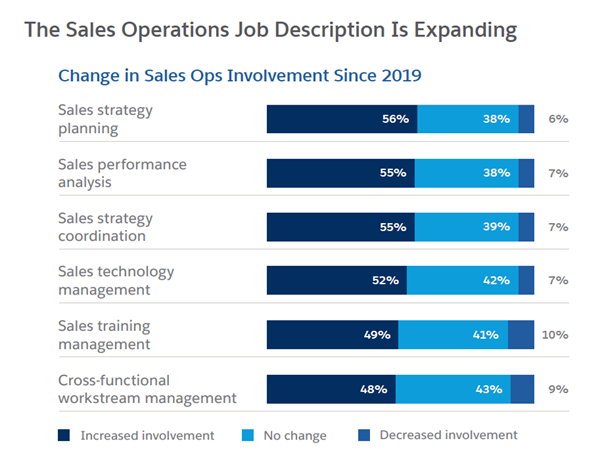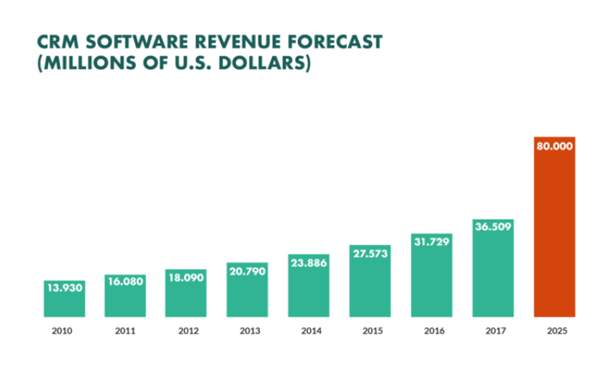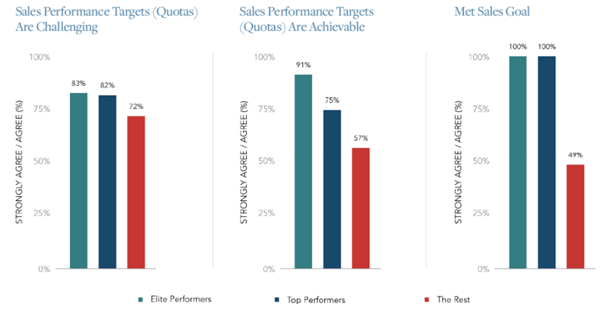But what you don’t often hear is the people making all this magic happen–the unsung heroes who work tirelessly to enable the frontline sales team to sell and succeed effectively.


Closing deals and crushing quotas are part of conversations between sales executives.
But what you don’t often hear is the people making all this magic happen–the unsung heroes who work tirelessly to enable the frontline sales team to sell and succeed effectively.
Meet the sales operations, a team that does everything from sales strategy, lead management, training, process optimization, and data handling. Even the most charismatic and resilient sales executive may find it hard to thrive without them.
While most organizations have a sales operations team from the get-go, only a few understand it completely.
Let’s dive deeper into sales operations and learn the top eight ways it can support your sales team to drive more revenue and new bookings.
Sales operations is “all the nasty number things that you don’t want to do, but need to do to make a great sales force,” says Patrick Kelly, He founded the first sales operations team at Xerox almost 50 years ago. Fast-forward to today; sales operations are still difficult to define even though this role is as critical as it ever was.

Sales operations is a department that is involved in optimizing the entire sales process—from start to finish. Additionally, they use technology and gather best practices, training, and strategic insights to increase sales performance. They are the ones that make salespeople more productive and successful by reducing friction and enhancing support within different processes.
In other words, the sales operations team does a lot of backend work with only one goal in mind: to quickly facilitate the closure of deals. While all this may overlap with sales enablement, they are not synonymous. Sales operations analyze the collected data and make decisions, while sales enablement facilitates the rolling out of these decisions. Sales enablement is often considered a subset of sales operations.
Roles and responsibilities of sales operations can vary depending upon company size and industry. Here are some day-to-day activities that cut across businesses:
Sales ops use different technologies to analyze data and see what's working and what isn't for their organization. They make data and insights actionable.
For instance, a sales manager wants to identify best practices to coach underperformers in the team. The sales manager can simply check her top performers' calls to gain better insights for training purposes. In such cases, sales operations can turn to conversation intelligence software for sales teams to unearth valuable insights into information such as the client's sentiment, how much time sales reps spend in meetings with SQLs, who is talking more during meetings, etc.
Sales ops teams can help optimize sales resources and increase revenue so that your superstars don't lose momentum. They are involved in territory planning and set key metrics to gauge the performance of sales teams.
Sales ops teams always keep their eye on the data. They identify the current deal opportunities and ensure they are assigned to the right rep. If there are not enough reps in one territory, they implement a territory rebalancing.

Time-consuming activities such as manual data entry or sending out proposals prevent sales reps from doing their best work. According to CSO Insights, inside sales-rep time spends only 33% of their time actively selling.
Sales operations teams improve the business process by removing roadblocks so that the sales team can focus more on selling and expanding revenue. They use different tools and technologies to ensure sales reps are not entering duplicate, meaningless data and managing administrative tasks. Whether you're seeking to optimize workflows, improve client engagement, or achieve your sales targets more efficiently, grata is engineered to support your ambitions. It can help you transform your sales process and empower your team for success by optimizing your sales efforts and revolutionising the way you work.
Accurately forecasting sales is one of the critical to-dos of sales operation. This sets the tone for a robust sales strategy. Sales operations predict future sales revenue for months, quarters, and years. They anticipate and regularly update new bookings the team will bring and by when. They leverage hard insights and data to reach these numbers. And no, there are no psychics involved.
Sales operations can have a massive impact on the efficiency of your sales team. For instance, they act as a bridge between different revenue-influencing departments to avoid jarring customers' experiences. Here are eight ways in which they can improve the sales team's productivity
Sales leadership is known to define efficient sales processes, but the sales operations teams transform that idea into a reality. They own the process of creating, maintaining, and enhancing the entire sales process in the company's Customer Relationship Management (CRM) software—one of the essential tools for sales reps to automate some of the tasks.
The CRM market is expected to reach 80 million dollars by 2025.
It goes without saying that choosing the right software is critical for any sales team. This ownership lies with the sales ops team along with process flow customisation and optimisation in the CRM system. This way, frontline sales can spend more time on closing more deals.
The actual value and benefits of using several tools lie in its integration.It can save you a lot of time from doing manual tasks such as logging in information to your CRM. Manual errors, and incomplete data are some of the problems when companies invest in various solutions that don’t integrate well.
Therefore, choosing the right tools is not enough. Since the sales teams work with several software solutions, including multiple communication software, the ops team must ensure that these are easily integrated for a seamless data flow. Allego is one software solution that can help; learn more at: www.allego.com/blog/what-is-sales-enablement/
For this reason, integration is a must to boost sales productivity. And while preparing their budget for purchasing new tools, the sales operations team should always add the integration cost.
Sales generate a lot of data to help marketing and customer success departments make more informed decisions and better campaigns. However, poor data management practices can saddle businesses with inconsistent data, resulting in incorrect findings.
Effective sales data management might be the responsibility of sales managers, but that doesn’t mean the sales ops team cannot take it up. The sales operations team can create a strategy for deciding communication frequency and the optimal system. They can help set up a few processes and best practices for follow-ups, prospecting, and messaging.
Following up on the previous point, the sales operations team is also responsible for reporting and communicating dashboard insights. These reports are essential to determine areas of improvement and understand the reason for errors.
Sales ops should effectively track the sales team’s performance with analytics to reduce the probability of making repeated mistakes and finding new opportunities.
An optimized, competitive team is the one that can achieve its sales quota. According to research, 82% of top sales performers and 83% of overachievers believe in having challenging quotas and still achieving them.
Setting unrealistic targets can cause conflict and, worst, create a situation where reps steal leads of others. Therefore, accurately setting quota is critical as it impacts employee motivation, compensation expectations, turnover, and selling behavior.
Sales ops must analyze historical sales numbers and the latest trends to help sales managers set quotas for each rep, their territory/market, and product type.
Burnout in sales is a real thing. Meeting targets, unresponsive clients, and the constant pressure to achieve quarterly quotas can take a toll on reps. That is why accurate forecasting is critical in sales as it allows sales managers to efficiently allocate resources, course correct, and manage cash flow. Similarly, revenue leaders can use these forecasted numbers to align revenue expectations and sales quotas and optimize the process for more wins.
Sales ops can boost your sales team’s productivity by accurately predicting pipelines without letting businesses lose margin or spend too little. Such precise forecasting can ensure efficient working of the resources and closing opportunities that might be missed otherwise.
According to the law of diminishing intent, “the longer you wait to do something you should do now, the greater the odds that you will never actually do it.” This holds true in sales.
Time kills sales. The more time sales reps spend creating proposals and delaying the deal, the less likely your prospect will commit. No matter how small the commitment is, it is always good to get the ball rolling. A pricing and proposal template can help version controls, avoid any slag from the sales, and close more deals.
Sales ops can create accurate pricing guidelines and templates. This means that whenever there is a qualified opportunity, the sales team can simply modify the pricing structure based on the given rules and share it with the customer to build their intent to buy. Document management—from case studies, and flyers to proposals and pricing—is a great favor the sales operations team can do for their sales teams.

Most sales operations teams don't directly speak with customers. However, for effective functioning of the sales department, the operations team needs to level up and directly communicate with the clients to understand them. This helps better align the customer and the sales team and irons out any operational issues that may arise, including onboarding, procurement, or contracts. If your sales team is handling all these, then it is time to hand it over to sales ops so that the reps can focus more on selling and crushing their quotas.
Behind every successful sales team is an operations team that works tirelessly without any fanfare. Right from sourcing the right tools and forecasting sales to managing operational issues and administrative tasks, they ensure the processes are optimized for efficiently running sales.
Sales operations can deliver several small yet significant changes that can impact the sales team's productivity and make them more successful. When they work closely with frontline sales, it results in a dynamic sales world that is more customer-centric and number-driven.
She is a Content Marketing Consultant at Fireflies.ai, an AI meeting assistant that helps transcribe, take notes, and complete actions during meetings. She has over a decade of experience writing on various topics and uncovering the cogs that drive customers and society at large. Medha believes there is no such thing as boring content. Her job at Fireflies is to develop communications strategies and transform B2B content from "yawner" to "page-turner". Head over to Fireflies blog to read more.






